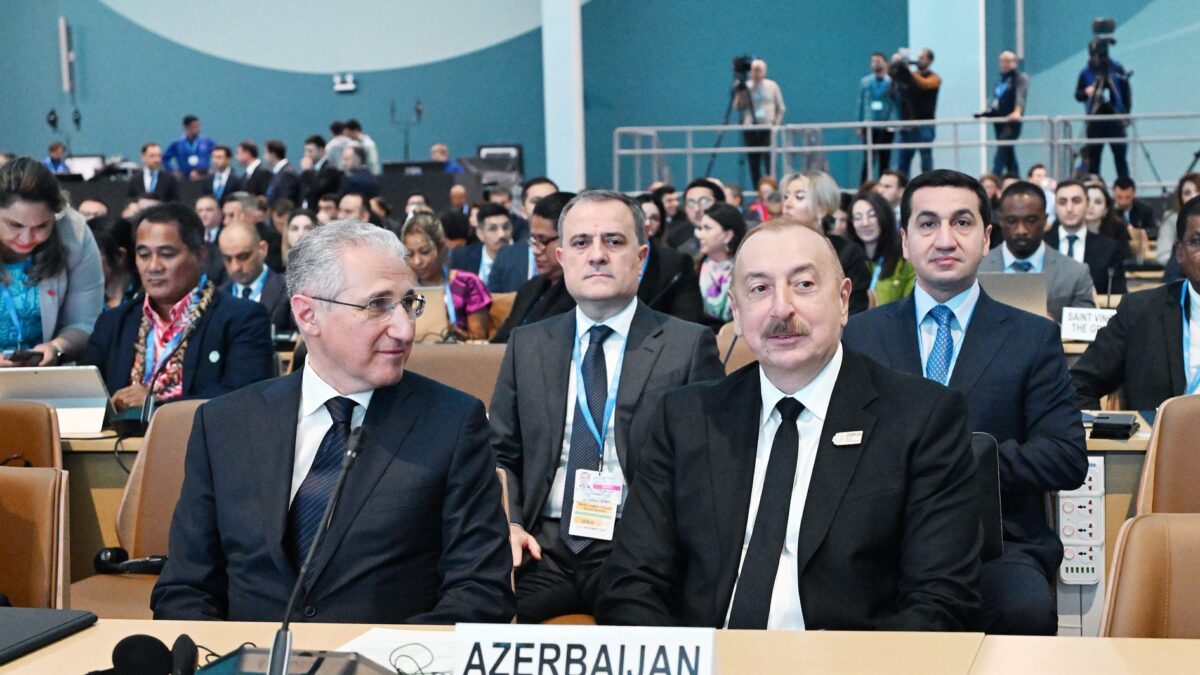Azerbaijan Takes Center Stage as COP29 Advances Ambitious Climate Agenda
Azerbaijan drives climate progress at COP29 with bold finance goals, SIDS support, and health-focused climate initiatives.
On the second day of COP29, the Republic of Azerbaijan solidified its role as a global climate leader, unveiling major initiatives to bolster support for small island developing states and pushing forward discussions on climate finance.
The conference, attended by over 70,000 delegates and 80 heads of state, marked a critical juncture in international climate negotiations as the clock ticks on achieving the Paris Agreement goals.
Draft Text for Climate Finance Goal Released
A breakthrough in the negotiation process came as the co-chairs of the New Collective Quantified Goal contact group released the first draft text outlining a new global climate finance framework. This text, a cornerstone of the COP29 Presidency’s agenda, was described as a “workable basis for discussion” by participating nations, marking a shift in the three-year technical dialogue.
“This is a significant step,” COP29 President Mukhtar Babayev remarked, acknowledging the urgency of finalizing the draft. “But the parties must remember that the clock is ticking, and we only have 10 days left.” The publication of the draft aims to identify potential agreements and areas of contention as countries race to establish a cohesive framework for climate finance.
Azerbaijan’s Commitment to Small Island States
At the Leaders’ Summit for SIDS, Azerbaijani President Ilham Aliyev called for greater global attention to the vulnerabilities of small island nations. Co-hosted by Samoa, Grenada, and Tonga, the summit focused on strategies to enhance resilience and access to climate finance for these nations, which are among the most affected by rising sea levels and extreme weather events.
“Azerbaijan stands firmly with small island states,” President Aliyev declared. “Developed countries must provide tangible financial and technical support to help them protect their homes and their futures.”
Azerbaijan’s leadership extended to the adoption of the Baku Declaration on Amplifying SIDS’ Voice at COP29 for a Resilient and Sustainable Future, which reaffirms the disproportionate impact of climate change on vulnerable communities and underscores the need for immediate action.
To facilitate meaningful participation, Azerbaijan also funded travel and accommodations for delegates from SIDS, supplementing its contribution to the UNFCCC’s Trust Fund for Participation.
Health Gains Momentum in the Climate Agenda
A high-level dialogue underscored the intersection of health and climate, featuring representatives from the World Health Organization, Spain’s Secretary of State for Health, and current and past COP Presidencies. Discussions focused on formalizing health as a core component of climate negotiations and leveraging global expertise to address the health impacts of climate change.
The meeting follows an announcement by the WHO and the Islamic Development Bank to operationalize the Health Impact Investment Platform, a financing mechanism aimed at mitigating health risks exacerbated by climate crises.
Early Warnings Initiative Highlighted
President Babayev also joined UN Secretary-General António Guterres to discuss progress on the Early Warnings for All initiative, aimed at implementing universal early warning systems by 2027. “No community should be left without these life-saving measures,” Babayev stated, urging greater international cooperation to protect vulnerable populations from hazardous climate events.
In a historic collaboration, the COP Presidencies — comprising the COP28 of UAE, COP29 of Azerbaijan and COP30 of Brazil—met to assess progress on implementing the outcomes of the Global Stocktake. The group laid the groundwork for sustained climate action, emphasizing the need for coherent strategies to ensure ambitious commitments in the next round of Nationally Determined Contributions.
As the summit enters its critical negotiation phase, all eyes are on Azerbaijan’s leadership to drive consensus and advance global climate ambitions. With time running out, the stakes could not be higher.

